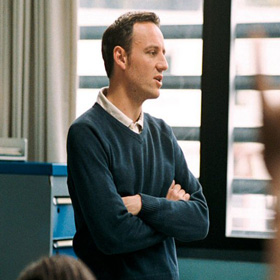Entre Les Murs (The Class)

4/5
When you consider that debating the national system is essentially a French national pastime and combine that fact with the highly charged, often-volatile love-hate relationship the country shares with its young people, it’s not difficult to see why Laurent Cantet’s pseudo documentary chronicling a year in a Paris classroom took home the Palme d’Or at this year’s Cannes. A more quintessentially French film you are unlikely to find.
That’s not to say it’s undeserving. On the contrary, while it might lack the visceral explosiveness of La Haine, as a follow-up examination of disenchanted youth thirteen years on and a mirror to contemporary French multi-culture, it is every bit as timely and every bit as relevant. Perhaps more so in fact because this is the battle waged rather than Kassovitz’s battle lost.
Author and former Cahiers du cinema critic Francois Begaudeau penned his semi-autobiographical novel after teaching high school literature in Paris for several years. While Cantet’s screen adaptation creates a documentary feel, it isn’t one – but it’s not really fiction either. With Begaudeau front and center of the classroom, he and Cantet engineer a series of scenarios where the real world struggles of the schooling process are played out between a real teacher interacting with real students. The loosely structured goals of any given scene perfectly mirror those of a classroom environment.
In choosing to remain exclusively within the confines of the school, Cantet succeeds in effectively distancing us from the rest of the world and, much like it’s American contemporary Brick, offer a microcosm of French society. Here every aspect of the human social dynamic is played out in the most crucially formative environment of them all; the subtle assertions and rejections of authority. Points made, points scored, ideologies torn down, doctrines rejected, all within the stifling four walls of a classroom. Cantet uses multiple cameras and quick cutting to weave in and out of the desks as the children talk over each other, impulsively jostling for position and status as the teacher at the front struggles to maintain focus.
Begaudeau’s increasingly exasperated efforts to get these kids to learn together at the same pace with the same level of interest reflects France’s larger problems of how to reconcile a fiercely traditionalist value system to a youth that by their own words are not really “proud to be French.” As Begaudeau and his students dance back and forth between respect, disdain and subtle indifference throughout the school year, the teacher’s room serves as a kaleidoscopic peephole to the larger debate where different strategies and approaches are hotly debated before attention turns to more pressing matters like the increase in the price of staff coffee. Here Begaudeau finds a colleague who prefers a more hard lined approach to discipline repeatedly challenging his idealistic pragmatism.
As with any education system, this is a battle for hearts and minds as well as obedience and Cantet’s nuanced guidance cleverly leads to incidents symptomatic of a culture trying to reach agreement with an increasingly multi-ethic, multi-cultural, multi-lingual generation that can’t be easily categorized or catered to. One particularly troubled student Soulyman must serve as a translator for his mother at his own disciplinary hearing because she can’t understand the teachers when they tell her that her son is in danger of being expelled.
Similarly after a teachers’ meeting in which representatives of the class are invited to participate and they act out, Begaudeau bluntly informs the two girls that they “made themselves look like skanks.” This leads to a formal complaint and a heated exchange in the playground where Begaudeau and the kids argue as to what exactly the expression means to each of them. The fact that such a damaging breakdown of communication is played out against the backdrop of a language and literature class only makes it all the more poignant.
While both Cantet and Begaudeau clearly both have a lot to say on the matter this is neither a blind indictment of an out of touch establishment, nor a leftist message film preaching understanding and the eradication of urban poverty. Rather The Class is a grudging acceptance that as it stands certain things are the way they are and this is a salute to the thankless task undertaken by teachers and students alike to co-exist and make the best of a bad situation.
Approaching its end the film’s focus is tightened as Begaudeau valiantly tries to prevent the expulsion of Soulymane as his immigrant parents will likely send him back to Mali if he is. With much of the closing quarter of the film preoccupied with the board’s ultimate decision, it only adds further weight to Cantet’s closing sucker punch. When Begaudeau closes out the year asking students what they learned, a girl speaking for the first time in the film states in a moment of sincerity and confusion that she learned absolutely nothing. The film closes out amidst Begaudeau’s quiet devastation over the undetected failure he has presided over with this young girl and we are left merely to ponder how to fix a system where despite the fiercest of efforts and the purest of good intentions there will always be those children who find themselves left behind.
Starring: Francois Begaudeau
Director: Laurent Cantet
Runtime: 108 Minutes
Distributor: Sony Picture Classics
Rating: R
RELATED ARTICLES
Get the most-revealing celebrity conversations with the uInterview podcast!







Leave a comment